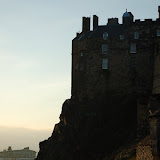Voyage en Écosse
Back from Scotland (and Normandy as well) with this message to report:
Every stereotype that you hold about the Scottish is true.
Seriously, it's pretty much just as you would have imagined it. If you have ever heard Sean Connery speak, seen the movie Braveheart, or even Fat Bastard from Austin Powers, you have a pretty good idea of what Scotland is like. I'll break it down into a few key points.
1. There are sheep everywhere.
The same way that you may see cattle herds next to the highway when driving through the rural United States, you see herds of sheep everywhere in Scotland. And not just a few sheep picking at the grass next to a barn, but thousands of sheep spread out over green hills.
2. They eat haggis.
I didn't eat haggis, but I saw it not only on restaurant menus but in cans at the supermarket as well. Who doesn't want to come home after a long day's work, pull out the can opener, and microwave some sheep offal packed into the same sheep's stomach. It helps to keep the chill of those cold, Scottish nights out.
3. They don't speak English.
Not only is it not English, but they are proud to say that it isn't English. Even the most exaggerated accents of some of the more outrageous, fictional Scottish characters (again, Fat Bastard comes to mind) can capture just how thick the accent is. At times I was really at a loss for what a person was telling me. It's not just a matter of accent though, either, as there is a whole set of specific vocabulary as well. Suffice it to say that I question the wisdom of taking a group of French high school students to Scotland so that they can improve their English.
4. They wear kilts.
Not everyday when they are out and about, but for formal occasions most people have kilts. Furthermore, it is an extremely expensive thing to buy, with the full price sometimes running upwards of $2,000. The best kilts are completely hand made, to the point that the seams are hand stitched without the aid of a sewing machine.
In all seriousness though, I had a really good time in Scotland. The students were generally well behaved, the worst we had to deal with were a people being late to a rendezvous on occasion. The landscape was at times breathtakingly beautiful. The color palette was something of super-saturated greens, blackish-browns, and cool gray skies. It was great to get out of the crowded smogginess of Paris for a few days into some clean air and impressive landscapes.
Highlights for me included the trip to the whiskey distillery (I can't stand the taste of the drink, rather, I am always curious to know the way things are made), walking through the ancient streets of Edinburgh, and looking out onto the placid, steely gray of the one loch we visited. In all it was a great trip though I am happy to be back with Esther and now Pete in Paris.
As always, follow this link to some pictures of my adventure:




